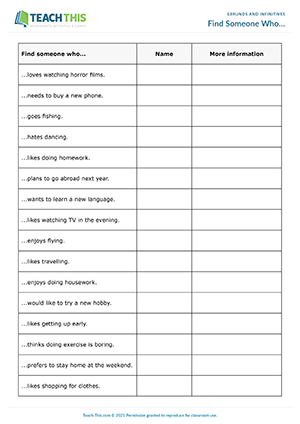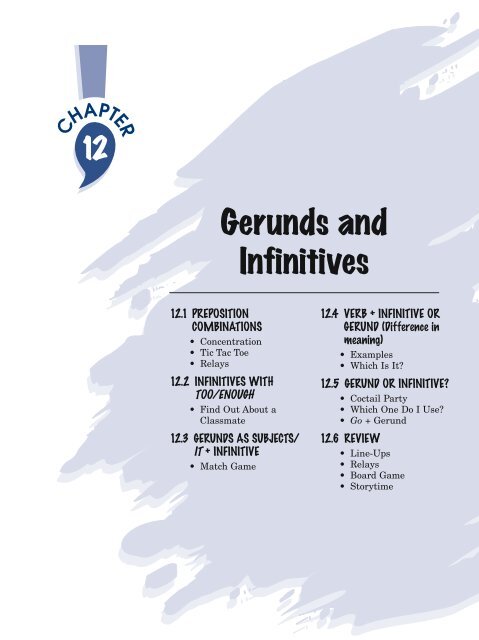Infinitives board game. Made particulary for the grammar point in Total English Intermediate dealing with gerunds and infinitives. You will probably want. Gerunds and Infinitives (Verbs) Target English Grammar. Gerunds and Infinitives (Verbs): – Gerund verbs. – Infinitives with “to”. – Infinitives without “to”. Student Proficiency Level. Upper-intermediate level grammar. Suggested Courses. General English. Instructions – Play the video in class after delivering a warm-up activity. This creative & engaging animated ESL video teaches learners about gerunds and infinitives (verbs) at the upper-intermediate level. Use this in class and hav. Jul 02, 2015 Gerund or infinitive? The second game is in Flash and will play only on desktop computers. It is called On Target, and your task is to choose the correct option and then shoot all the bad cows and ducks. You can shoot one of the bottles on the wall to get a bonus. Gerund or infinitive – On target game.

Gerund Vs Infinitive Game Free

GERUND vs INFINITIVE
Gerund and infinitive forms of verbs in English: when to use them.
One of the difficulties of the English language is that some verbs are followed by the gerund (ex : doing ) and others are followed by the infinitive (ex : to do)
Below you will find some guidelines and examples to help you.
When do we use the Gerund?
(verbs ending in -ing, ex: doing)
- After verbs that express likes/dislikes :
like, love, enjoy, dislike, hate, don't mind, can't stand ..- I really hate walking home in the rain.
- My grandmother enjoys/likes doing crossword puzzles.
- He enjoys listening to music in the car.
- After certain other verbs such as :
admit, appreciate, avoid, consider, delay, deny, finish, imagine, involve, keep (on), mention, miss, postpone, suggest ..- The boy admittedhitting the window with the ball.
- We appreciate having a bus stop close to our house.
- My mother avoids lifting heavy loads because of her back.
- I can’t help laughing when the actor pulls a funny face!
- Would you consider doing a few extra hours?
- She delayed leaving until the ambulance arrived.
- The suspect denied breaking into the house.
- We discussed putting an advertisment in the newspaper.
- The manager finished writing the report, then left.
- My father gave up smoking last year and feels better now.
- Can you image walking such a long distance?
- The job involves making presentations and speeches.
- My parents miss living close to the shops.
- Eva mentioned going to the same college as Alex.
- Tom postponed calling home until the flight was booked.
- The tourist office recommended taking the train.
- The group resumed talking once the door closed.
- The shop assistant remembered giving her a receipt.
- Don’t risk aggravating the situation. Just leave it as it is!
- Jack suggested taking a taxi instead of walking home.
- After prepositions :
- worried/nervous/anxious about ..- I'm a bit worried about driving in the snow.
- She'snervous about walking home alone in the dark.
- He'sanxious about moving to a new country.
- Are you interested in working for us?
- Would you like to walk instead of taking the bus?
- My mother is fond of doing crossword puzzles.
- Julie is good at making cakes.
- My dad is keen on watching sports on television.
- Before leaving the office, please turn off the lights
- After tidying the kitchen she went straight to bed.
- I look forward to meeting your friends.
- Pedro had to get used to driving on the left.
- After certain expressions :
- it's no use ..- It's no use pleading - I won't change my mind.
- It's no good shouting at him - he's deaf!
- There's no point in cooking food - nobody's hungry!
- It's no use pleading - I won't change my mind.
- The gerund can also serve as a noun:
- My father dedicated his life to teaching.
- Carla is addicted to shopping.
- Swimming is my favourite sport.
- Quarelling is a waste of time.
- We witnessed the cruel killing of seals.
When do we use the Infinitive?
(for example to do) Epubor vitalsource downloader.
Gerund Vs Infinitive Esl
- After verbs that refer to a future event :
want, hope, intend, would like, promise ..- I would like to do a course in medieval history.
- He promised to return the book after reading it.
- She hopes to find a job when she graduates.
- After certain verbs such as :
afford, agree, arrange, choose, need, fail, happen, help, learn, manage, offer, refuse, seem ..- I agree to pay for the damage.
- Harry managed to get tickets for the match.
- We arranged to go to the party together.
- After adjectives:
- glad/happy/relieved ..: (glad to know that ..)
- pleased/delighted... : (pleased to meet you..)
- disappointed/sorry... : (disappointed to hear that .)
- After 'too' and 'enough'
- It's too difficult to explain how it happened.
- It's easy enough to install. You can do it yourself.
Try an exercise
Gerund And Infinitive Games Pdf
See also: When can we use both?

Gerund Vs Infinitive Game Download
Please note that British English spelling is used on this website.